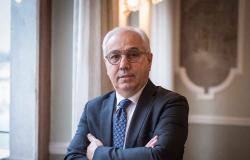FOGGIA – At the end of the solemn Eucharistic concelebration in the Cathedral Basilica of Foggia, Monsignor Giorgio Ferretti, Metropolitan Archbishop of Foggia-Bovino, led the traditional Corpus Domini procession through the streets of the historic center of Foggia.
The procession, attended by a large crowd of faithful, made two significant stops along the route. The first stop was held at the headquarters of the University of Foggia in via Arpi, where we prayed for the young people and their future. The second stop took place in front of the Town Hall, where a moment of prayer was offered for the city and its rulers, hoping for wisdom and justice in the local administration.
Along the crowded streets, the procession continued its journey until reaching Piazza XX Settembre. Here, Mons. Ferretti concluded the event with a message addressed to the community and the Eucharistic blessing, bringing to a close a day of profound spirituality and unity for the citizens of Foggia:
«I am the living bread that came down from heaven». Jesus says in the Gospel of John in front of the synagogue full of people, in front of an amazed crowd.
Everyone immediately shows scandal at the words of this young Rabbi: “How can this man give us his flesh to eat?”. But where does this scandal come from? Certainly from the attachment to a tradition, but above all from the fact that those men do not feel hungry, do not feel need, apparently satisfied with their life, do not intend to stoop to asking Jesus for an explanation of his words.
Yes, sisters and brothers, if you are not hungry, you cannot understand this speech of Jesus, which was given in a society marked by poverty, where many begged for bread. Let us think of the crowds hungry for the gospel for whom Jesus multiplies bread. Let’s think about those in our city who ask for a meal in our canteens, last year there were around 22,000 meals given by Caritas canteens; these are waiting for a word which is the bread of life. And let’s think about how wheat is expensive and lacking in Africa. There is a lack of bread in the south of the world due to the war, the speculation of the rich, while the weak, the children, die of hunger.
These desperate people of the earth are those who wait for a word which is the bread of life; they understand Jesus’ words well.
Truly the poor in the Gospel are always closer to the words of the Lord, because Jesus comes to feed a concrete need of men, and those who are hungry listen, while those who are full judge it absurd.
And so we too, sometimes suffocated by our certainties, by the materialist idea that what I see, what I buy or sell is true, have judged the Gospel to be absurd, we have considered it excessive, incredible.
But this evening let’s stop the rhythm of our lives to question ourselves and try to understand this speech of Jesus.
“I am the living bread that came down from heaven” says Jesus “If anyone eats this bread, he will live forever. And the bread that I will give is my flesh for the life of the world.” There is a great mystery in the Eucharist. A mystery that has its roots in Jesus’ last supper with his disciples, when he transformed the bread and wine into his body and his blood.
That last evening, in front of the twelve astonished people, Jesus, anguished by death, broke the bread and gave it to them to eat: “This is my body, offered as a sacrifice for you”.
Everyone ate, no one dared to contest or object, in that grave moment everyone felt the great love that flowed from that gesture, the love that can only flow from those who give their lives for others, and this made them feel that food was bitter. Who else in the history of humanity has been able to say words like those of Jesus: “I am the living bread that came down from heaven”.
But when faced with words of such great love, the satiated of all times have been afraid. It is the scandal of those who understand deep down in their hearts that Jesus decides to live a different life, away from conformism, materialism and self-love, to spend it instead for their fellow men. And the bread broken in the Eucharist every Sunday means precisely this, a life like this, bent on loving men, on serving them to the point of breaking.
Who in our time, sisters and brothers, will want to follow this path? Who will want to bend over the lives of others until they break? To the point of giving himself food? This is the scandal of the sated, of the conformists.
But this is also the greatness of Francis of Assisi. He knew how to respond to this limitless love offered by Jesus. He knew how to make himself poor, make himself bread, make himself the Gospel. He wrote, as we know, in his will of 1226, just before his death: “Of the same most high Son of God I see nothing else corporeally, in this world except his most holy body and his most holy blood.”
This is why the Church is built around the Eucharist. The Lord’s last supper in fact constitutes not only the Eucharist but also the community of disciples.
We could say that it is the Eucharist itself that constitutes the community. Even our communities. In the Eucharist we are free to recognize our sins, we feel the mercy of God on our lives, we can direct our prayer to the Lord, but together with this, we look around and see, we feel brothers and sisters close by, who pray with us, who are amazed with us by the presence of the Lord, of his Spirit.
Here we feel the joy of not being alone on the road to conversion. We rejoice in this: the Lord did not want us alone, he placed brothers alongside us, he gathered us together with them around the table of the Eucharist.
We can look them in the eyes every day, walk with them, serve together with them the dream of a better world, and we feel strengthened by this brotherhood. We are not alone on the road of life. As in this evening’s procession. We are together on the pilgrimage of life.
For this reason we pray today and always for the Holy Father Francis, for the Church, our archdiocese, this family; We pray that the Lord accepts this Sunday sacrifice that we make to him and protects us from evil and gives peace to the world.
Because with the Church, we too feel the body of Jesus bitter in our mouths. It is the bitterness of his suffering, it is the bitterness of the suffering of too many men and women in our world. The bitterness of a world that cannot find peace.
In the liturgy we feel this bitterness, in the broken host we feel many broken lives.
They are the lives of children who have no bread, of little ones who die under the bombs.
For this reason the prayer of the disciples of Emmaus also flows from our hearts: “Stay with us Lord because it is approaching evening”. Evening falls on many peoples of the world, evening falls on the lives of defenseless children, on lonely elderly people, on abused women, evening falls on many immigrants exploited in this time also in our country.
But listening to the prayer of the disciples of Emmaus, Jesus stopped for dinner and they recognized him in the breaking of the bread. And so even today the Lord, listening to the prayer we address to him, stops with us, listens to us and we believe that like the disciples of Emmaus, for all of us in the Holy Eucharist he will break the bread that gives life and give peace.
Amen






